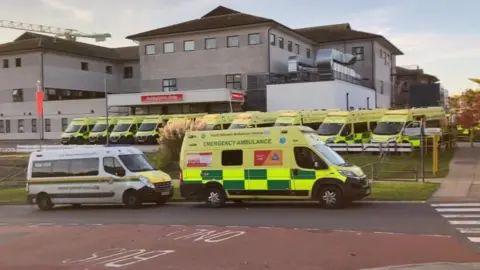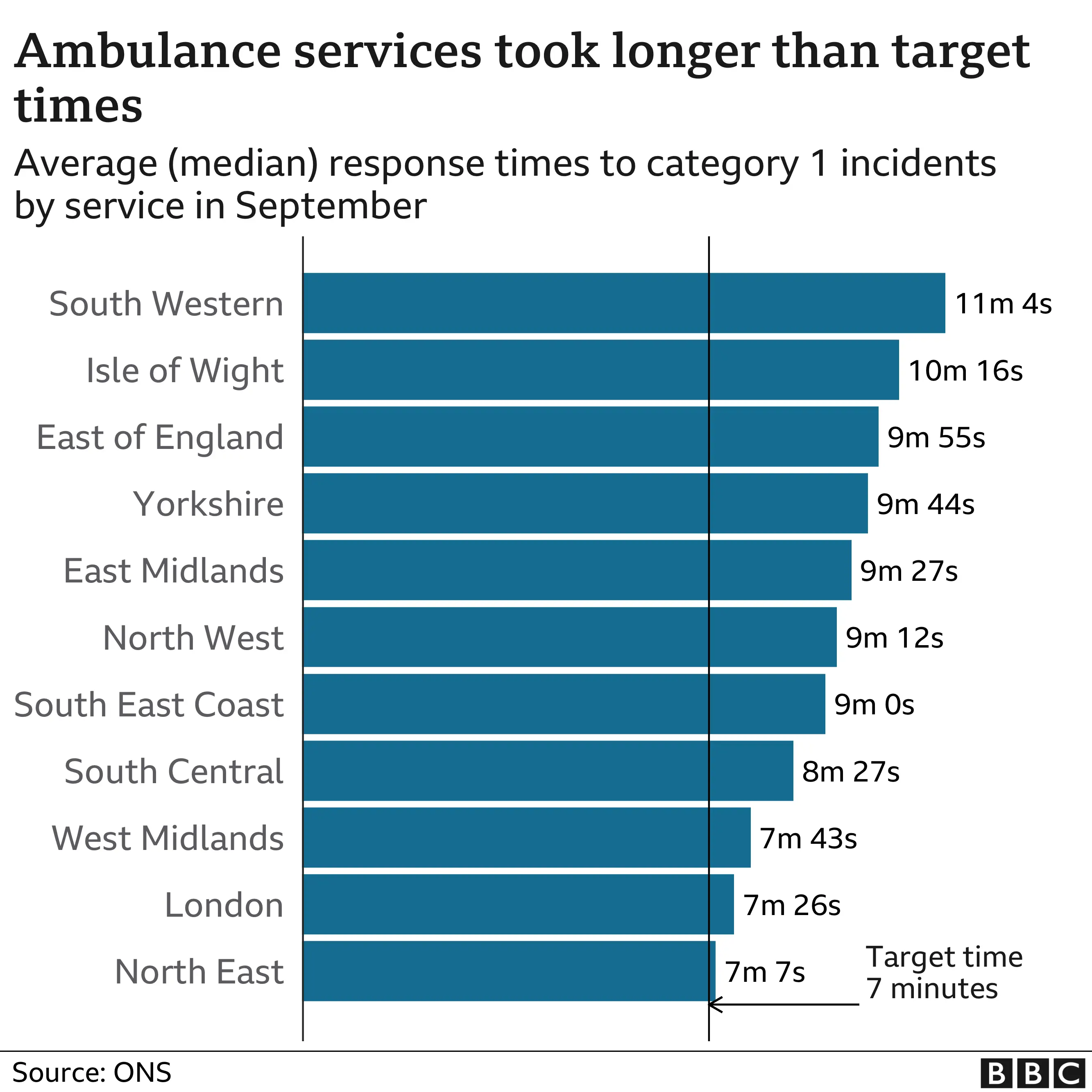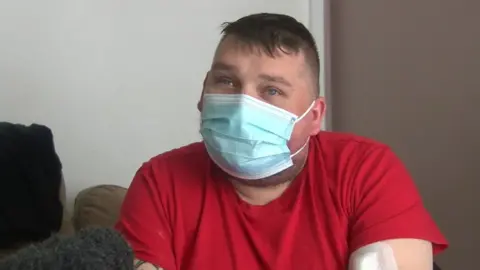A&E waits 'crippling' ambulance services
 BBC
BBCLong waits for ambulances are largely due to staff being unable to hand over patients to hospitals, according to the head of one of England's services.
South Western Ambulance Service (SWAS) recorded the longest response times for life-threatening and emergency incidents across England in September.
The most serious cases were seen in about 11 minutes on average, the target time for NHS services is seven minutes.
Will Warrender, CEO of SWAS, said: "We are busier than we've ever been."
He said the service was under "the most sustained period of pressure in its history", adding "the situation today is no better than it was in September".
Delays in being able to offload patients at hospital A&E departments was having "a crippling effect on our ability to provide emergency services," Mr Warrender said.
When hospitals, particularly those with accident and emergency departments, become busy, patients can be kept in ambulances until space becomes available.
The latest figures from NHS England covering September suggest across the country the average response times for ambulance services to life-threatening - or category one - incidents was about nine minutes, the longest since August 2017.
These include 999 calls for people who are struggling to breathe or have had a cardiac arrest.

Response times started to lengthen in February 2021 and continued up to July, before increasing again in September.
For SWAS, September has also seen it record its longest response times on record for life-threatening and emergency incidents since reporting began in 2017.

'I couldn't breathe'

Lee Hole, 36, from Camborne in Cornwall, found himself struggling to breathe one night in early October.
Mr Hole is registered blind, a double amputee and has chronic kidney failure, so rang his family for assistance, then called for an ambulance.
"They said we were a blue light priority and someone would be there as soon as they could."
Staff later said the situation would be handed over to a medical team seeing him for his kidney condition the next morning.
"It was horrible, waiting, when you can't breathe and you can feel yourself drifting off, it's not a nice feeling. If my sister hadn't been able to get over and get me out of bed, it doesn't bear thinking about," he said.
"This is a situation where it would have been good to have a paramedic come out and assist instead of relying on family members who aren't qualified in that field," he added.
SWAS apologised to Mr Hole and said it was unable to reach him due to high demand on services.
'We don't have the resources'
Ginny Rowe's husband, Les, recently had a heart attack and died in hospital.
Ms Rowe, from Penzance, said they waited an hour and a half for an ambulance, before waiting a further six hours outside Royal Cornwall Hospital in Truro.
"I couldn't even get through to the ambulance service straight away, I was put on hold, it was that busy," she said.
Ms Rowe was unable at that time to go to hospital with him due to Covid-19 restrictions, but said she understood her husband spent 24 hours on a trolley in A&E and "passed away very suddenly having gone into full cardiac arrest".
She said she did not blame the hospital or ambulance services, but added "we don't have the resources down here - something needs to happen".
"All the time we talk about 'if things aren't done then people are going to die' well my husband has died, and nobody can replace him for me and his friends and family."

Mr Warrender stressed the current issues were not "the problem of the hospitals" adding his NHS colleagues were also facing challenges in discharging patients.
He added SWAS was recruiting more staff due to additional funding from NHS England, and teams were looking to treat more patients outside of hospitals where possible.
Accident and Emergency waiting times across NHS hospitals in England are at the highest levels seen in the year so far.
In September, on average about 35% of patients attending emergency departments had to wait more than four hours before being assessed.
'Seek help early'
Royal Cornwall NHS Trust had the second highest percentage of patients waiting more than four hours for treatment in England, at 59%.
A spokeswoman for NHS England and Improvement South West said: "The NHS is exceptionally busy with the highest ever number of patients seen in A&E in September alongside managing record 999 ambulance calls, while still also delivering thousands of tests, checks, treatments and operations.
"That's why people should seek help early if they do not feel well. Anyone needing help should use 111 online first so that staff can advise on the best option for their care."
Another trust covered by SWAS, Plymouth, said rising Covid admissions had left some patients experiencing "long delays".
Kevin Baber, University Hospitals Plymouth's Director of Strategy said: "Ambulance handovers have been an issue and there have been times when patients have had to wait to be handed over to the care of Emergency Department.
"We are doing everything we can, and are doing our best to make sure patients are assessed and triaged as quickly as possible."
About half a million Covid patients have been treated in English hospitals.
